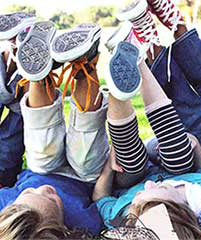Movement linked to school boost
 Experts say marching, wiggling and tapping a beat helps young children to develop their self-regulation skills and improve school readiness.
Experts say marching, wiggling and tapping a beat helps young children to develop their self-regulation skills and improve school readiness.
Education researcher Dr Kate Williams recently designed a low-cost preschool program focussing exclusively on rhythm and movement activities linked to pathways in the brain to support attentional and emotional development.
“Think heads, shoulders, knees and toes but do the actions backwards while you sing forwards. It tricks the brain into gear,” Dr Williams said.
A new study involving 113 children from lower socioeconomic communities, measured the effectiveness of the program to boost self-regulation skills.
The study revealed what Dr Williams describes as the ‘musician advantage’ – enhanced neural plasticity and executive functioning – particularly among children given formal musical instruction.
“The children who have music lessons from a young age are often from families who can afford them,” she said.
“The problem is that the children who most need the musician advantage miss out because it isn’t affordable for all families to access highly quality music programs”.
The preschool program involved group sessions for 30 minutes twice a week across eight weeks, with stages becoming more challenging to stimulate change and development in self-regulation skills.
The findings have been published in the international journal Psychology of Music.








 Print
Print